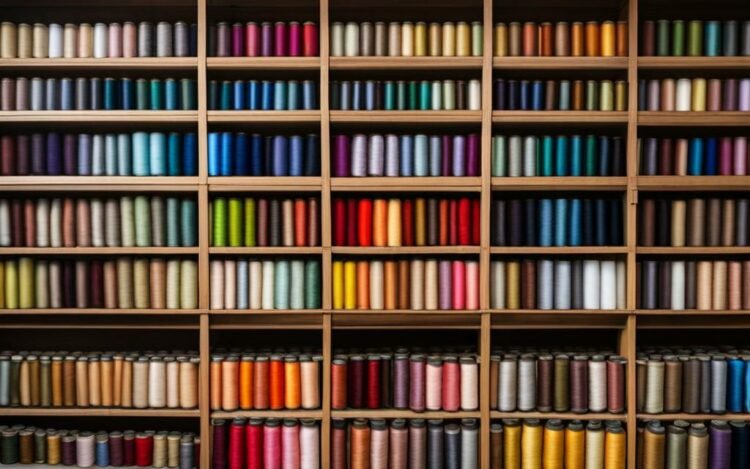If you’re in the market for sewing threads, this comprehensive guide will help you make the right purchase. With information sourced from various reliable sources, including the Threads Sewing Guide and expert advice from Threads magazine, you can trust that the information provided here will guide you in choosing the best sewing threads for your projects.
Key Takeaways:
- Choosing the right sewing thread depends on the fabric you’re working with.
- Consider the fiber content and specific requirements of your project when selecting a thread.
- Factors to consider when buying sewing threads include quality, tension resistance, and compatibility with the fabric.
- Online retailers like Amazon and fabric stores offer a wide range of sewing thread options.
- Proper maintenance, such as storing threads in a cool and dry place, helps preserve thread quality.
Understanding Sewing Thread Basics
When it comes to sewing, choosing the right thread is essential for achieving strong, durable, and visually appealing results. Understanding the basics of sewing threads will help you make informed decisions and select the most suitable thread for your projects.
Types of Sewing Threads
Sewing threads come in various types, each with its unique characteristics and uses. The most common types include:
- Cotton thread: Ideal for sewing natural fiber fabrics like cotton and linen. It provides excellent stitch definition and blends seamlessly with the fabric.
- Polyester thread: Known for its strength and durability, polyester thread is suitable for a wide range of fabrics, including synthetic and blended materials.
- Nylon thread: Strong and resistant to breakage, nylon thread is commonly used for heavy-duty projects like upholstery, outdoor gear, and leatherwork.
- Rayon thread: This thread has a lustrous appearance and is often used for decorative stitching, embroidery, and embellishments.
Choosing Sewing Threads
When selecting a sewing thread, consider the fabric type, project requirements, and desired aesthetic. Use cotton thread for lightweight and natural fabrics, polyester thread for general sewing, nylon thread for heavy-duty projects, and rayon thread for decorative stitching. Additionally, match the thread color to the fabric or opt for a color that complements or contrasts with your design.
By understanding the basics of sewing threads and considering factors such as fiber type, project requirements, and aesthetic preferences, you can confidently choose the right thread for your sewing projects.
Pro Tip: Need to stock up on sewing thread or fabrics? Look no further than SewingMachinesPlus.com coupons for discounts on all your sewing essentials. Shop smart and save big on your next crafting project!
Factors to Consider When Buying Sewing Threads
When it comes to purchasing sewing threads, there are several important factors to consider. These factors will ensure that you make the right choice and end up with threads that are suitable for your projects. Here are some key things to keep in mind:
Thread Quality
One of the most important factors to consider when buying sewing threads is the quality of the thread. High-quality threads are less likely to break or unravel during sewing, providing a strong and durable finish. Check for smoothness, strength, and elasticity in the thread to ensure it meets your quality standards.
Fabric Compatibility
Another crucial consideration is the compatibility of the thread with the fabric you’ll be working with. Different fabrics have different properties, such as thickness, stretch, and weave. Choose a thread that complements the fabric to ensure that your stitches hold up well and don’t create any tension or puckering on the fabric surface.
Reviews and Comparisons
Before making a final decision, it’s always a good idea to read reviews and compare different brands and types of sewing threads. This will give you insights into the experiences of other sewers and help you choose a trusted and reliable product. Look for reviews that mention thread strength, colorfastness, and overall customer satisfaction.
By taking these factors into consideration, you can make an informed decision when buying sewing threads and ensure that you have the right materials for successful and satisfying sewing projects.
Where to Buy Sewing Threads
If you’re looking to buy sewing threads, you have a variety of options available to you both online and in physical stores. Here are some top places to consider when making your purchase:
1. Online Retailers
Online retailers like Amazon offer a wide range of sewing threads from various brands. You can browse through different options, read customer reviews, and compare prices without leaving the comfort of your home.
2. Fabric Stores
If you prefer to see and feel the threads before buying, fabric stores like Jo-Ann Fabric and Craft, Hobby Lobby, and local sewing supply stores are excellent options. They usually have dedicated sections with a wide selection of threads from different brands.
3. Popular Thread Brands
Some of the top sewing thread brands include Gutermann, Coats & Clark, Mettler, and Aurifil. These brands are known for their quality and reliability, and you can often find their threads in various stores both online and offline.
When deciding where to buy your sewing threads, consider factors such as convenience, price, and brand reputation. Each option has its advantages, so choose the one that best suits your needs and preferences.
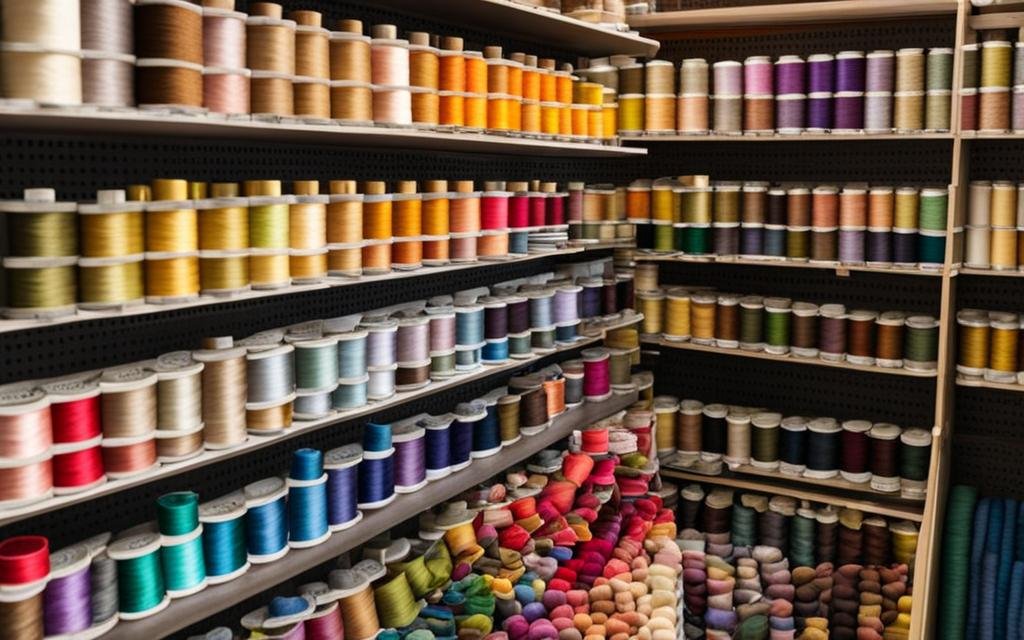
Tips for Sewing Thread Maintenance
Proper maintenance of your sewing threads is crucial for preserving their quality and ensuring optimal performance in your sewing projects. Follow these tips to keep your threads in excellent condition:
- Store in a cool and dry place: Moisture can damage your threads, causing them to weaken or become brittle. Store them in airtight containers or ziplock bags in a cool and dry area to prevent any moisture-related issues.
- Avoid direct sunlight: Prolonged exposure to sunlight can fade the color of your threads. Keep them away from windows or any direct sunlight sources to maintain their vibrancy.
- Gently unwind: Instead of pulling or yanking the thread from the spool, unwind it gently. Tugging can lead to breakage, tangling, or even knots, causing frustration and wastage of thread.
- Clean your sewing machine regularly: Lint buildup from threads can accumulate in your sewing machine, affecting its performance. Clean the bobbin area and remove any lint regularly to avoid any disruptions while sewing.
By implementing these maintenance practices, you can extend the lifespan of your sewing threads and ensure they remain in optimal condition for your future sewing endeavors.
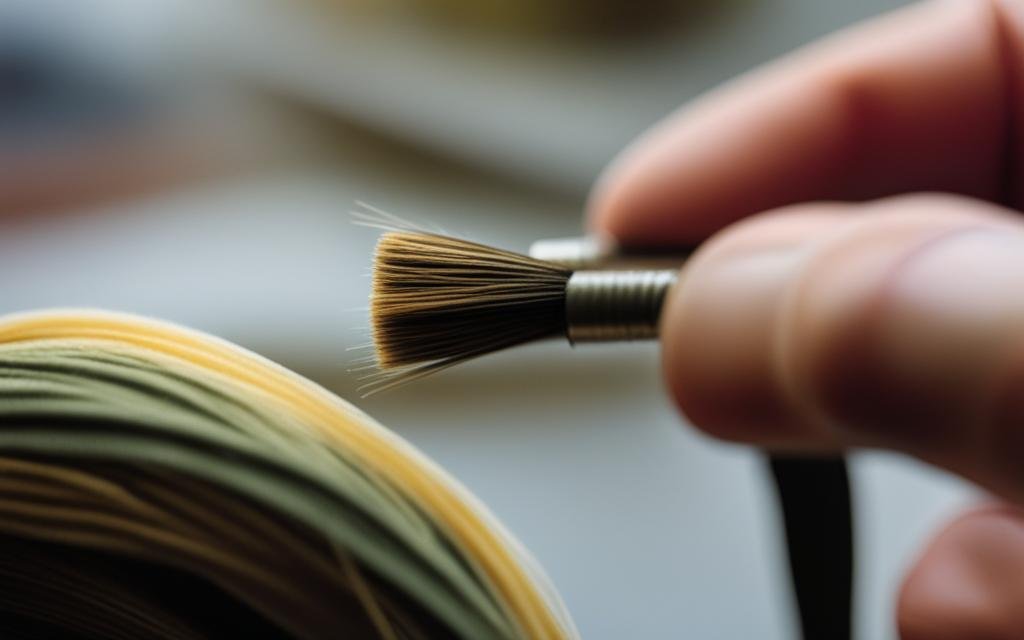
Remember, taking care of your sewing threads is an essential part of being a responsible and efficient sewer. By storing them correctly, avoiding sunlight exposure, handling with care, and keeping your sewing machine clean, you can preserve the quality and longevity of your threads, ensuring they are always ready for your next creative project.
Using the Threads Sewing Guide as a Resource
When it comes to choosing the best sewing threads for your projects, the Threads Sewing Guide is an invaluable resource that you can rely on. This comprehensive guide covers a wide range of topics related to sewing, including tools, materials, basic sewing skills, and garment construction. With its thorough explanations and helpful tips, the guide is a go-to reference for sewers of all skill levels.
One of the highlights of the Threads Sewing Guide is its in-depth coverage of sewing threads. The guide provides essential information on different types of sewing threads, their characteristics, and the fabrics they are most suitable for. By consulting this guide, you can make informed decisions about which threads to use for specific projects, ensuring that your stitches are strong and durable.
Furthermore, the Threads Sewing Guide offers valuable insights into sewing thread comparisons. It provides recommendations for the best sewing threads available in the market, taking into consideration factors such as quality, durability, and performance. With this information at your fingertips, you can confidently choose the right sewing threads that will enhance the overall quality and longevity of your sewing projects.
Enhance Your Knowledge
Whether you’re a beginner or an experienced sewer, the Threads Sewing Guide is a must-have resource for expanding your knowledge and skills. It not only helps you select the best sewing threads, but also provides guidance on various other aspects of sewing. From learning about different fabrics and their properties to mastering advanced techniques, this guide covers it all.
By using the Threads Sewing Guide as a reference, you can elevate your sewing projects to new heights. With its comprehensive information and expert advice, you can confidently explore new sewing techniques, experiment with different fabrics, and create garments that showcase your skills and creativity.
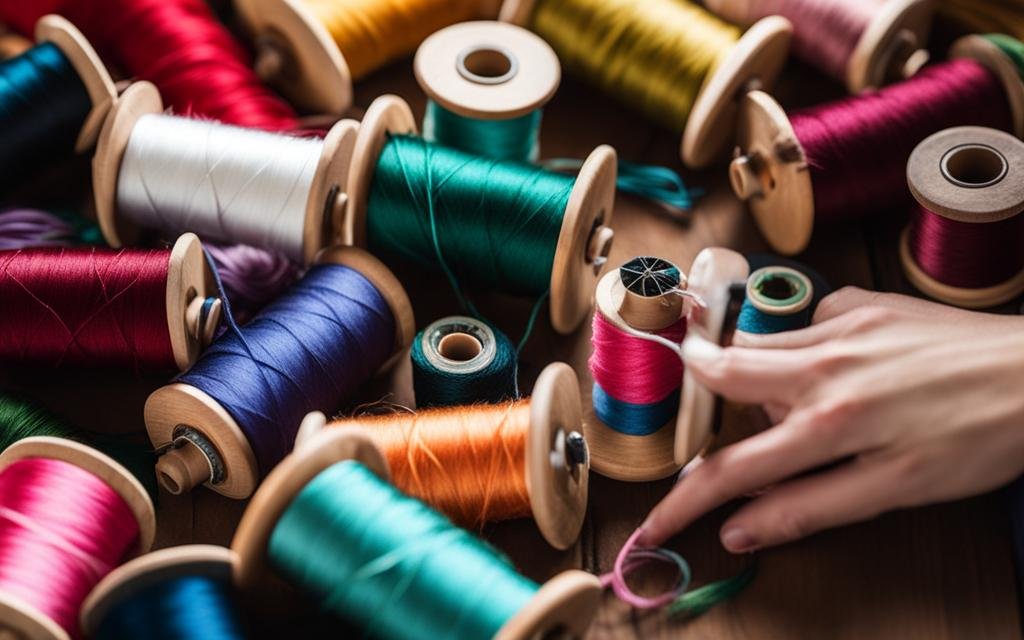
Take advantage of the wealth of knowledge that the Threads Sewing Guide offers. Delve into its pages and discover a treasure trove of information that will empower you to make the best choices when it comes to sewing threads and other sewing essentials. With this guide by your side, you can embark on sewing projects with confidence, knowing that you have the insights and expertise of industry professionals guiding you every step of the way.
The Importance of Thread Quality in Sewing
When it comes to sewing, the quality of the thread you use is paramount. The right thread can make a significant difference in the durability, appearance, and overall success of your sewing projects. Whether you’re creating garments, home decor items, or accessories, investing in high-quality thread is essential for achieving professional results.
High-quality threads are carefully crafted to ensure they are smooth, strong, and resistant to friction. This means they are less likely to break while sewing and will result in sturdy, long-lasting seams. The smoothness of the thread also reduces friction, preventing unnecessary wear and tear on both the thread and your fabric.
Another important factor is the stretchiness of the thread. Quality threads have the perfect amount of stretch, allowing them to move with your fabric and withstand regular wear and laundering without breaking or puckering the seams. This is especially vital for projects that require elasticity, such as sewing stretchy fabrics or creating garments with lots of movement.
Additionally, high-quality threads produce minimal lint. Excessive lint can accumulate in your sewing machine and cause issues with its performance. Choosing threads that produce less lint will help keep your machine running smoothly and reduce the need for frequent cleaning and maintenance.
Summary:
- Using high-quality thread is crucial for achieving professional results in your sewing projects.
- Quality threads are smooth, strong, and resistant to friction, resulting in durable seams and minimal wear on your fabric.
- The stretchiness of the thread ensures it can withstand regular wear and laundering without breaking or puckering.
- Choosing threads that produce minimal lint helps maintain the performance of your sewing machine.
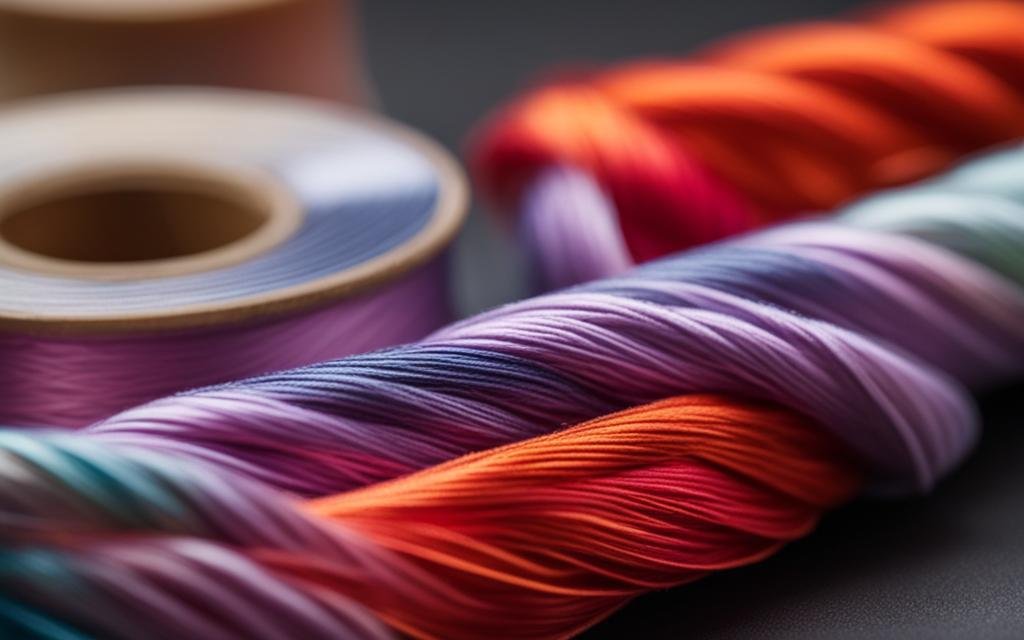
Conclusion
Congratulations on completing this comprehensive sewing thread buying guide! Armed with the knowledge and insights shared here, you are now ready to make informed decisions when purchasing sewing threads for your projects.
Remember, the type of fabric you’re working with plays a crucial role in choosing the right thread. Consider the specific requirements of your project and select the appropriate thread material, whether it’s cotton, polyester, nylon, or any other suitable option.
When it comes to buying sewing threads, you have plenty of options. Online retailers like Amazon offer a wide variety of brands and options. If you prefer a hands-on approach, visit fabric stores like Jo-Ann Fabric and Craft or Hobby Lobby, where you can see and feel the threads before making your purchase.
With this guide as your reference, you now have a comprehensive understanding of sewing thread basics, factors to consider when buying, and tips for thread maintenance. Whether you’re working on clothing, quilting, or any other sewing project, choose high-quality threads that will contribute to the longevity and professional appearance of your creations. Happy sewing!

